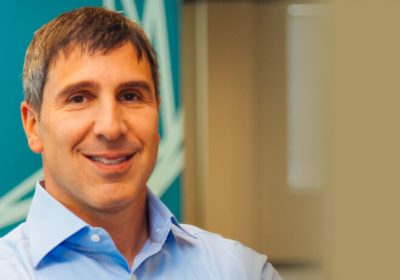
- Author: Richard McBride | Editor CFO Magazine A/NZ
- Posted: November 27, 2023
Scaling a Hyper Growth Business > Andrew Butt, Co-Founder & CEO, Enable
Serial entrepreneur & CEO, Andrew Butt recently achieved the coveted unicorn status with his rebate management start-up Enable, having raised $120M in Series D funding led by Lightspeed Venture Partners, with participation from locally based Telstra Venture Capital.
CFO Magazine A/NZ Editor, Richard McBride, had the opportunity to meet with Andrew during his recent visit to Australia and discuss scaling a ‘hyper growth’ business in Silicon Valley, his own industry heroes, how his father was his first CFO and why it’s good for CEOs to have a ‘healthy tension’ with their own Finance Chief.
RM – Andrew, thank you for joining us today, Enable assists CFOs and finance teams around the world with their Rebate Management, but what impact and influence has finance had on your life?
AB – My father was an accountant and he advised lots of small businesses, and he also owned and managed businesses. My dad was quite inspiring for me as a kid and he’s still a good CFO advisor even today.
I always wanted to run before I could walk in every way. So, I started my very first business (a domain registration and website support business) when I was 14 years old. It kind of started to take off and I eventually compressed five days a week of schooling into four hours on a Saturday morning.
I’m not an accountant myself but understanding a P&L and a balance sheet is always important. Numbers have always been important to me.
RM – Can you share with us how your passion for building businesses snowballed into what is Enable today?
AB – Starting as a teenager, I was running services companies by building software for other people. They would tell us what their requirements were and then we would build software for them. As we were doing that, we were looking at lots of interesting problems to be solved, but I really wanted to build my own product.
So rather than just building products for other people, I decided to create something myself.
The world of rebate management was something we were being asked to solve and we were building bespoke software for different companies. As a services business we were kind of profitable.
We were just charging for our time and it was growing slowly, I could see that launching a product and trying to become a market leader would be very capital-intensive and a very different model. It took a while to make that leap, but we did eventually make it.
RM – What was the size of Enable now and how did you scale that?
AB – Initially we had a team of about 50 and then around 2016, 2017, we had the initial version of the product. We won our first couple of customers and there was then a phase probably from 2017 to 2019 where we kept trying to do it all. So, we were still doing the services company and we were trying to do this product on the side. I wanted to really raise money to then be able to shut down the services side and just focus entirely on the product. It took until about early 2020 to do that.
I had a key moment in the middle of 2018 when I was in a CEO group called Vistage and I pitched to the whole group and they all said, ‘You need to focus on the product’. One of them said, ‘If you want to do this on a big scale, you need to move to California’. My wife and I moved in December 2019.
We got quite far while bootstrapping because we’d funded Enable from the services company. We’d actually got to a couple of million of revenue without any funding. That was quite unusual for Silicon Valley, which meant it was quite compelling to the first-round investors.
Since then it’s just really been performance and having the right people that we’ve attracted and pulled into the company, which has allowed us to continue to scale and raise more capital. Next quarter we’ll have more than 600 staff.
RM – What are the next stages of growth for Enable and where do you see the company in the next few years and beyond?
AB – There are different stages of any kind of hypergrowth company and in the early stages, you’re just trying to get the thing off the ground. What’s great about Silicon Valley is the people there realise that to create a significant impactful global company you do need to go fast.
It’s just like a rocket where you need to escape velocity, otherwise you just can’t get out of the gravitational pull. We’ve been in that rocket phase over the last three years – really burning fuel, burning capital to establish this thing.
The next two-to-three-year phase is to increase efficiency and start to create a really sustainable long-term company rather than just launching it in the first place.
The market we’re in is massive and there’s hardly anyone in it. There’s not many competitors and we’re still very small, so we need to have the ability to grow that top line very fast. The danger is if we get to profit too quickly, we’ll just plateau.
So for me, from a financial point of view, the rule of 40 type guidance – we need to show that profit plus growth rate is at least 40 per cent and probably more than that. And if in two or three years we’re still burning, but that’s come down significantly and the growth rate is still very high, then that probably is the place to be.
RM – Do you have any aspirational fellow CEOs or ‘role model’ businesses you look to benchmark with?
AB – I was with the CEO and co-founder of Cloudflare the other day. That’s a company that’s gone from zero to a billion in revenue and their market cap is around say $20 billion. It’s a great company because the two founders are still there, they started it from nothing and it’s still growing fast at that scale.
I really think Enable could be in the top 10 of B2B SaaS companies globally by market cap. I think that’s how big it can be because a lot of people have talked about supply chain digitization for 20 years, but it’s still not really happened.
We are graphing the supply chain because every time we win a new customer, we take all of their trading partners, all of their transactions and we graph the whole thing so we could be that company. So, when I look at role model companies, they would literally be the top handful of companies by market cap.
We have also added two new members to the Enable Board of Directors, including Dan Levin. Dan is the former President and COO at Box and is a current member of Box’s board. He was instrumental in scaling the company and taking it public and Arsham Memarzadeh, a Partner at Lightspeed and has led the firm’s growth practice, primarily investing in product-driven enterprise software companies. In addition to Enable, he’s led the firm’s investments in Axonius, ClickUp, Personio, Verkada, and Wiz.
RM – We’ve spoken to a number of CEOs / CFOs in America and the talent battle can be fierce. Is poaching or headhunting common in the unicorn environment?
AB – One reason we haven’t hired too many staff in Silicon Valley is because you’ve got literally Google and Facebook and Apple right there. So we’ve chosen places where it’s not quite that aggressive.
We have about 250 in Stratford-upon-Avon in the UK, more than 200 in Toronto, about 40 in Australia right now, and that’s up from about four not that long ago, and then everything else is just scattered across the US.
RM – How did the relationship with your (Enable) CFO, Nick Rose begin & how would you describe a good CEO-CFO partnership?
AB – I remember the very first meeting I had with Nick. He was the divisional CFO of a large distribution company in the UK, and he’d got his team to literally search Google for rebate management because there was a problem in the UK with where Tesco had overstated their profit and it came out that it was due to incorrectly managing commercial income from suppliers. The hole in their P&L was about $250 million.
Nick was asked by his CEO if the same thing could happen to their company, and he said it could because they were running a manual system.
So, they found Enable and I remember sitting across the table pitching to him and we immediately got on very well. Eventually, we were selected, and they really helped us to flesh out and build our capabilities and it worked well for him because they found millions of pounds of savings.
Nick said Enable should go global and to speak to him if I was ever looking for a CFO. I thought, ‘Wow, that’s quite a big thing’.
In 2019, when I asked him on board, we couldn’t really afford him. I offered to pay him two or three days a week and he took the leap. The rest is history, really.
There needs to be a very strong partnership between the CEO and the CFO, and we have a very healthy relationship. There’s lots of debate and healthy tension.
I remember someone saying, you don’t want the CFO to be a handbrake. So, it’s got to be more challenging and pushing back, but it’s got to be someone that can actually enable and support the vision rather than just slamming the brakes on. I think Nick’s been very adaptable because again, the way that you would run a public company in the UK is very different to a Silicon Valley venture company in those early stages.
RM – Do you have any ‘golden rules’ in business?
AB – I think having high standards and being quite impatient is important in terms of not tolerating too much nonsense because that then sets the tone of what’s acceptable in the company. Being prepared, making sure everyone’s prepared for a discussion, and having a focused agenda so it’s not just meandering and wandering all over the place.
My dad has always said that it’s important to back your judgement and it’s better to make 10 decisions quite fast and get seven of them right than it is to take a long time to make less decisions. Just make the decision and move on because most decisions are reversible.
RM – Andrew, thank you for your time today and we look forward to following the Enable journey and wish you all the best in the next stages of growth, especially here in the A/NZ region!
To learn more about Enable and rebate management visit: www.Enable.com








